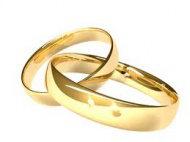Muslim & Christian experts discuss guidelines for Interreligious Marriage

Representatives from relevant charities, Christian churches, and a number of Muslim organisations came together in London on 28 February 2013 to explore areas of cooperation between Muslims and Christians who want to support Christian-Muslim couples. The discussion centred on how the Ethical Guidelines to Interfaith Marriage could be used within the communities, and by outside agencies, to achieve this aim. The guidelines: 'When Two Faiths Meet. Marriage, Family and Pastoral Care – Ethical presence', were launched on 26 November 2012 in Westminster Abbey by the Christian Muslim Forum.
Sheikh Ibrahim Mogra, present at the round table discussion, said that he was “delighted that the guidelines have been received well by both faith communities and are already proving to be a very useful tool in the pastoral care of married couples of different faiths”. Catholic representatives included Elizabeth Davies, Marriage and Family Life Project Officer at the Bishops’ Conference of England and Wales, who is keen to see how the guidelines can be incorporated within Bishops’ Conference guidelines on preparing couples for marriage, saying that “our research suggests that as many as 16% of Catholic marriages are with people of other faiths, marriages between Muslims and Christians are particularly common”. Bishop Paul Hendricks, the Christian co-chair of the Christian-Muslim Forum, also continues to support the guidelines and the process of their implementation: “As they are the fruit of long deliberation and discussions, it is good to see that the guidelines are of real practical help to those who support marriages at the grass roots level, and that they spark a further process of conversations and cooperation. This is an important and valuable process, which shows how harmony between religions can help to create a better society for all”.
Locally, Catholic-Muslim couples can turn to the parish priest for advice, and the coordinators for marriage and family life ministry in the dioceses can also offer support – their contact details can be found at www.familias-ew.org.uk.
The call for respect for the faith of each of the prospective spouses in the guidelines is echoed in the Catholic Bishops’ Conference of England and Wales’ teaching document on interreligious dialogue “Meeting God in Friend and Stranger. Fostering respect and mutual understanding between the religions”: “the beliefs and religious practices of the partner who is not Christian must be treated with proper respect, and given every possible consideration consistent with Catholic faith and teaching”, stressing that “interreligious marriage can offer opportunities for deepening faith and for cultural enrichment”.
For more information see: www.christianmuslimforum.org/index.php/resources.
For resources and support aimed at Christian-Muslim couples, go to www.mcmarriage.org.uk/index.html


















